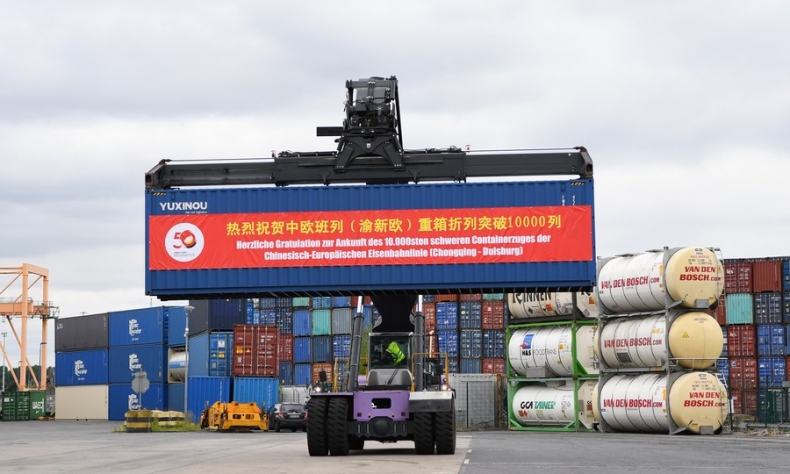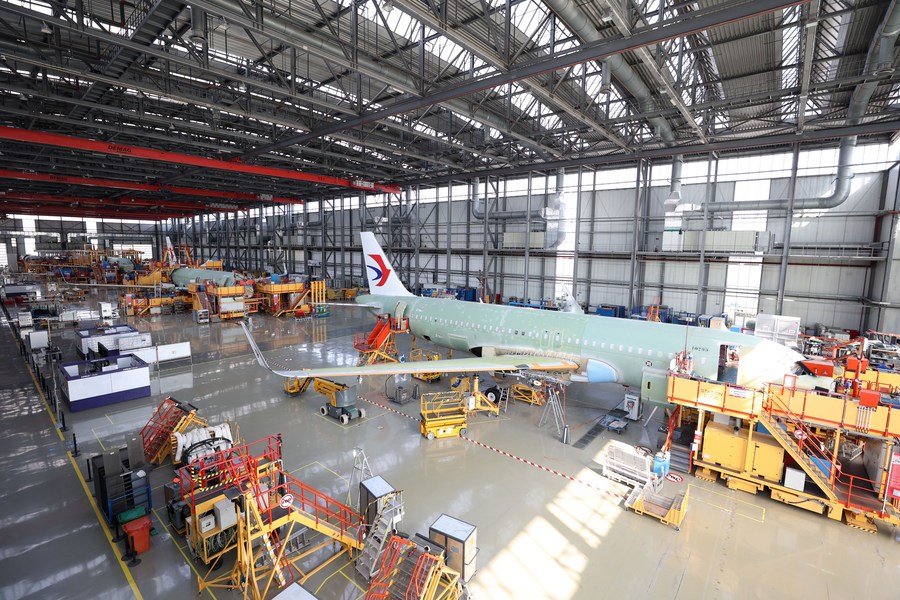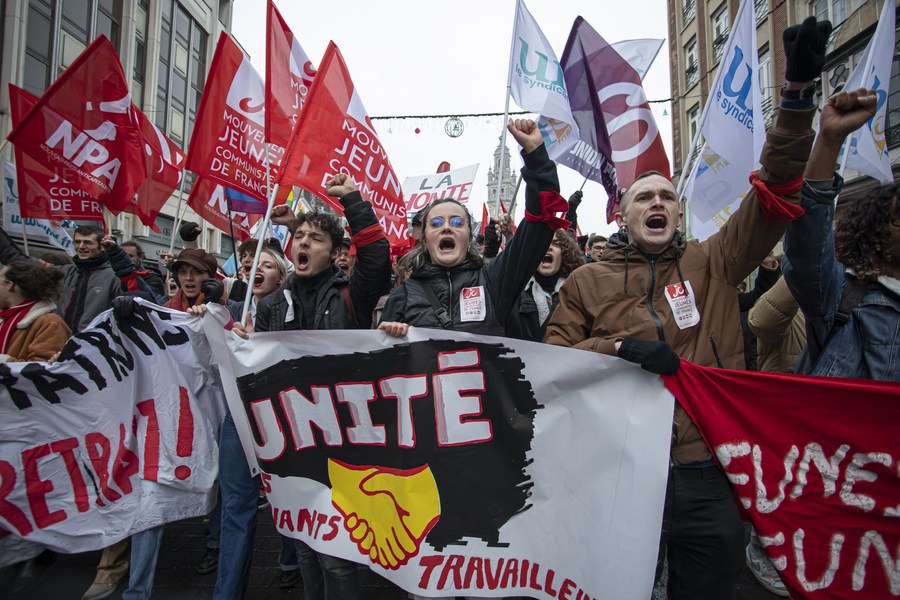The Doorbell Symphony

The recent visits by EU and major member state leaders to Beijing demonstrate the bloc’s willingness to improve relations and maintain economic cooperation with China across a range of fields.
In late March, Spanish Prime Minister Pedro Sánchez paid a two-day visit to China. French President Emmanuel Macron and European Commission President Ursula von der Leyen soon followed suit, jointly sitting down with President Xi Jinping in Beijing on April 6.
Political analysts suggest that the frequent high-level exchanges signify buoyant relations between China and Europe.
Economic drivers
Since the onset of the Ukraine crisis in February 2022, the EU has enforced 10 rounds of sanctions against Russia. Despite their intended goal of weakening the Russian economy, these measures have achieved the opposite and resulted in energy shortages, inflation, fiscal deterioration and economic stagnation within the bloc.
The most recent data from Eurostat, the EU’s statistical office, show the EU faces a natural gas shortage of 27 billion cubic meters in 2023, a deficiency equivalent to 6.8 percent of its annual demand. Rising inflation has also impacted the EU due to sharp increases in energy prices, as well as the U.S. Federal Reserve’s consecutive interest rate hikes over the past 12 months. Germany’s inflation rate reached a record high of over 10 percent in September 2022 and France’s consumer price index rose 5.2 percent in 2022, far outpacing the 2021 level. All in all, inflationary pressures have generated financial turmoil and growth slowdown within the eurozone. For good measure: The EU is the political and economic grouping of 27 countries committed to shared political values. Eight of these countries do not use the euro, leaving 19 nations in the so-called eurozone, who share the common currency.
To prevent a deep recession, the governments of EU states have provided fiscal support, leading to public finances being sorely tested and risking the sustainability of government debt. The European Commission predicted that GDP growth will come in at a mere 0.3 percent for both the EU and the eurozone in 2023.
Meanwhile, last August, U.S. President Joe Biden signed into law the $430-billion Inflation Reduction Act—offering funding, programs and incentives to accelerate the transition to a clean energy economy, which took effect on January 2. The act is expected to lure businesses away from the EU, sparking fears of a further hollowing-out of European industries.

Therefore, the EU and its member states are in urgent need of securing more orders from China to alleviate their economic struggles. Macron’s three-day visit entailing a delegation of business leaders and executives from France’s leading electricity producer Électricité de France, Alstom (a key actor in mobility in the country) and commercial aircraft manufacturer Airbus, among others, proved said need.
Security concerns
“Strategic autonomy,” an approach initiated in 2013 referring to the capacity of the EU to act autonomously in strategically important policy areas, has been rendered a mere slogan. The Ukraine crisis has had far-reaching consequences for Europe’s collective security, prompting the EU to expand its reliance on the U.S.-led NATO. The EU has given up its security autonomy to the U.S. by following the latter in imposing sanctions on Russia and offering military aid to Ukraine.
And EU member states are now splitting over solutions regarding the Ukraine crisis. Nordic and Eastern European countries view Russia as the primary threat and push for “defeating Russia” to ensure “peace and stability” in the region. The leaders of France, Germany, Italy and Hungary, however, believe that overwhelming Russia is neither practical nor achievable.
Demonstrations have recently fanned out in cities across Germany, Italy, Austria and Greece to oppose European governments lending Ukraine “lethal military assistance” by continuing to send weapons to the country and call for efforts to make Russia-Ukraine peace talks an option on the table. Following increasing public pressure, the leaders of several EU states now seek to resolve the conflict between Russia and Ukraine through negotiations. Other European countries, such as France, have even seen the population call for a full withdrawal from the NATO alliance.
China’s recent diplomatic moves have demonstrated to the EU that it may very well be a reliable mediator in the Ukraine crisis. On February 24, China issued its position paper on the political settlement of the Ukraine crisis, putting forward a 12-point peace proposal to end the conflict; from March 20 to 22, President Xi visited Moscow and had lengthy talks with Russian President Vladimir Putin; and then there are the various Chinese officials who maintain open lines of communication with their Ukrainian counterparts. The visiting European leaders also expressed hopes to increase communication and make joint efforts with China toward peace.

Common good
EU members are facing tremendous pressures both at home and abroad. In France, for instance, Macron’s proposed pension reform has triggered massive demonstrations and clashes between police and civilians, with eight nationwide protests in just two months. Protesters even called for Macron’s resignation.
The refugee crisis caused by the escalation of the Ukraine crisis and the influx of refugees and immigrants from Africa and West Asia have exacerbated the situation, leading to further protests and social unrest across France, Germany, Italy and Greece, in turn destabilizing Europe’s political climate to even greater extent.
When the EU branded China a “systemic rival” in 2019, it strained the bilateral relationship. Add to that the Ukraine crisis which has negatively impacted the economy, security and sociopolitical situation of EU members. As a result, it is now crucial for the bloc to collaborate with China at this critical time.
China is an important partner of the EU in coping with development challenges, having given, for example, firm support to the latter’s efforts to overcome the European debt crisis in the wake of the 2008 global economic meltdown. As the EU’s second largest trading partner, China and the bloc share complementary and mutually beneficial economic interests. They also share common interests in issues including, but not limited to, climate change, global governance, the multipolarization of the international order, as well as strong opposition to nuclear weapons proliferation and arms race.
The recent visits by EU and major member state leaders to Beijing demonstrate the bloc’s willingness to improve relations and maintain economic cooperation with China across a range of fields. By teaming up once again, China and the EU can enhance their partnership and contribute to resolving the current issues.
The author is the director of the Research Center for China-EU Relations at the Institute of International Relations under Tsinghua University.
 Facebook
Facebook
 Twitter
Twitter
 Linkedin
Linkedin
 Google +
Google +










